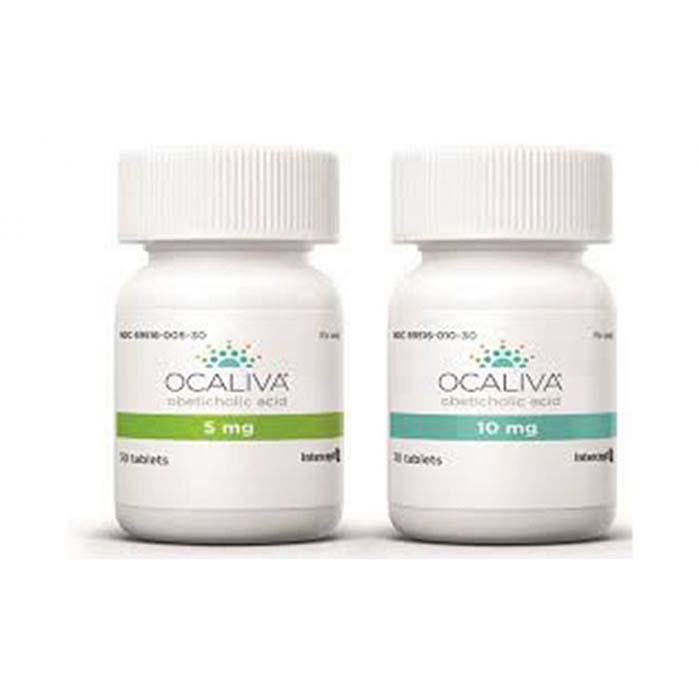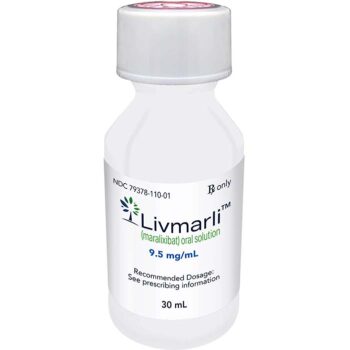In Stock
Buy Ocaliva (obeticholic acid) Online
DISEASE INDICATIONS: Primary Biliary Cholangitis (PBC)
MANUFACTURER: Intercept Pharma Ltd
USAGE: Oral
MEDICINE APPROVED BY:
European Medical Agency (EMA)
Food and Drug Administration (FDA)
Health Canada
Therapeutic Goods Administration (TGA)
Ocaliva, known by its generic name Obeticholic Acid, is a medication used to treat certain liver disorders, primarily primary biliary cholangitis (PBC). It is also being investigated for its potential use in other liver-related conditions.
From $2,582.07
Ocaliva, known by its generic name Obeticholic Acid, is a medication used to treat certain liver disorders, primarily primary biliary cholangitis (PBC). It is also being investigated for its potential use in other liver-related conditions. Here is a detailed description of Ocaliva (Obeticholic Acid):
- Mechanism of Action: Obeticholic acid is classified as a farnesoid X receptor (FXR) agonist. It works by activating FXR, a nuclear receptor found in the liver and intestines. Activation of FXR helps regulate bile acid synthesis, transport, and detoxification in the liver. In primary biliary cholangitis (PBC), there is a disruption in the normal flow of bile acids in the liver, leading to liver damage. Ocaliva helps reduce the accumulation of bile acids in the liver and slows down the progression of PBC.
- Indications: Ocaliva is primarily indicated for the treatment of primary biliary cholangitis (PBC) in combination with ursodeoxycholic acid (UDCA) in adults with an inadequate response to UDCA or as a monotherapy in adults who cannot tolerate UDCA.
- Administration: Obeticholic acid is available in tablet form and is typically taken orally once daily. The dosage and duration of treatment are determined by the prescribing healthcare provider based on the patient’s specific condition.
- Effectiveness: Clinical studies have shown that Ocaliva, when used in combination with UDCA or as a monotherapy, can effectively improve liver function, reduce liver fibrosis, and alleviate symptoms in patients with PBC. It can slow down the progression of the disease and improve the overall quality of life for individuals affected by this condition.
- Safety Profile: Like all medications, Obeticholic Acid may have potential side effects, including itching, fatigue, abdominal pain, and elevated levels of certain liver enzymes. Patients should discuss potential side effects and any concerns with their healthcare providers.
- Monitoring: Patients taking Ocaliva may require regular monitoring of their liver function, lipid levels, and overall response to treatment. This helps ensure that the medication is effectively managing their PBC and that any potential side effects are promptly addressed.
- Contraindications: Ocaliva is generally not recommended for individuals with known hypersensitivity to the drug or those with certain liver conditions, such as decompensated cirrhosis.
- Research and Development: Obeticholic acid is also being studied for its potential use in other liver-related conditions, such as non-alcoholic steatohepatitis (NASH) and primary sclerosing cholangitis (PSC). Ongoing research may explore its long-term safety and efficacy in these areas.
It is essential for individuals with primary biliary cholangitis or other liver disorders to consult with a healthcare provider who is knowledgeable about these conditions and their treatment options. Ocaliva (Obeticholic Acid) offers hope for symptom relief and improved liver function for those living with PBC.









Reviews
There are no reviews yet.